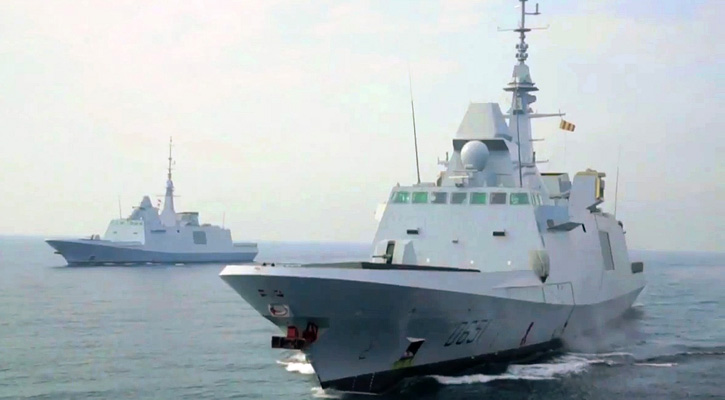LCS Dual-Buy Blessing from Congress ?
Several lawmakers have concerns about the Navy’s proposal to buy Littoral Combat Ships (LCSs) from the two competitors, putting into question whether the service will receive the blessing it wants from Congress before the end of the year.
Perhaps most significantly, House Armed Services Seapower subcommittee Chairman Gene Taylor (D-Miss.) said he cannot support the Navy LCS acquisition plan until service officials disclose the cost of the two ship proposals.
“At the end of the day Congress has to spend the money and I’ve got to go home and tell 700,000 people whether or not I think it’s a good deal, and quite frankly they’re asking me to sign on to something and they won’t tell me what they’re going to pay, and I can’t do that,” Taylor said in an interview yesterday.
He spoke about the LCS proposal on Tuesday with both Navy acquisition chief Sean Stackley and Chief of Naval Operations Adm. Gary Roughead. Though Taylor lost his reelection on Nov. 2, and Republicans won enough seats to take over the House in January, Democrats control the chamber until the end of the year and Taylor remains the head of the Seapower panel and a needed supporter.
Other lawmakers who have expressed reservations about the LCS change include HASC Seapower Ranking Member and presumptive future chairman Rep. Todd Akin (R-Mo.), Senate Armed Services Committee (SASC) Ranking Member John McCain (R-Ariz.), SASC member Susan Collins (R-Maine), and Senate Appropriations Committee member Richard Shelby (R-Ala.).
The Navy announced earlier this month it wants lawmakers’ approval by mid-December to kill its plans to buy 10 LCS from either a Lockheed Martin -Marinette Marine team or Austal USA, and instead buy 10 of the ships from each of the competitors, for a total of 20 of the shore-hugging vessels. The service had been weighing which LCS builder to choose to build the next 10 ships, from fiscal years 2010 to 2014, and also planned to gain the rights to the winning ship’s design so another company could build five of them starting in FY ’12.
If Congress does not approve the new LCS acquisition plan by mid-December, a Navy spokeswoman said, the service would proceed with its standing plan to select one shipbuilder (Defense Daily, Nov. 4). The Navy wants to change its LCS plans because Lockheed Martin and Austal USA’s bids were affordable and the service realized it could buy more ships with a dual procurement, Roughead said Tuesday.
Each LCS builder made early versions of the littoral ships that ran far over the planned cost of $220 million per ship. Austal USA was teamed with General Dynamics [GD] previously with the LCS program, though the two companies split for the current competition.
Taylor said Stackley told him Lockheed Martin and Austal USA’s latest bids were below a congressional cost cap. Yet the Navy official would only tell the congressman a range of the proposed prices, and not the precise dollar figures; that’s because the Navy has not yet entered into the contracts with industry and thus
the data is proprietary to the companies.
“Given the track record of this program, and quite frankly this is going to be one of the last major decisions I make, I’ve got to see the numbers,” Taylor said. “And I’ve got to have the assurance of those that are going to be looking over this program that they’re going to be vigilant in not letting this thing backslide the way it did before.”
“If I’m satisfied with the numbers, and I get the assurance that they will be vigilant this time in controlling the costs, then I would support it,” he added.
Akin, who likely will chair the HASC Seapower panel starting in January, said he has multiple questions about the LCS proposal. He questioned, in an interview, how buying LCSs from both competitors jibes with Defense Secretary Robert Gates’ stance on other weapon-system competitions, such as his opposition to splitting the Air Force refueling tanker contract between the two competitors and to continuing to develop a second engine for the F-35 Joint Strike Fighter (Defense Daily, Nov. 12).
McCain, meanwhile, told reporters Tuesday that he would have to be convinced there is a “very strong reason for overriding” Congress’ approval of the existing LCS plan.
“Of course I have concerns about it,” McCain said after talking to Navy Secretary Ray Mabus. “We had hearings, we passed legislation, now we’re going to have to look at whether there’s a sufficient reason to reverse it.”
McCain questioned if Congress could approve the new LCS plan under the Navy’s tight deadline. Congressional aides, saying they don’t expect any hearings on the issue during the current lame-duck session of Congress, also said a mid-December decision will be tough.
Other lawmakers expressing qualms with the LCS proposal include Collins, who is concerned it would preclude General Dynamics’ Bath Iron Works (BIW) in Maine from building future LCSs. Shelby, an Austal USA backer, the day the Navy announced the proposed dual buy said he was concerned about its costs.
The LCS plan, though, has the support of two key senators: SASC Chairman Carl Levin (D-Mich.) and Senate Appropriations Committee Chairman Daniel Inouye (D-Hawaii).
“I think it’s the right way,” Levin said Tuesday. “They got the benefits of competition. They got the price below the cap.”
“I think they have a good program,” Inouye also told reporters. “Competition. That’s how the price came down….I like two companies.”

